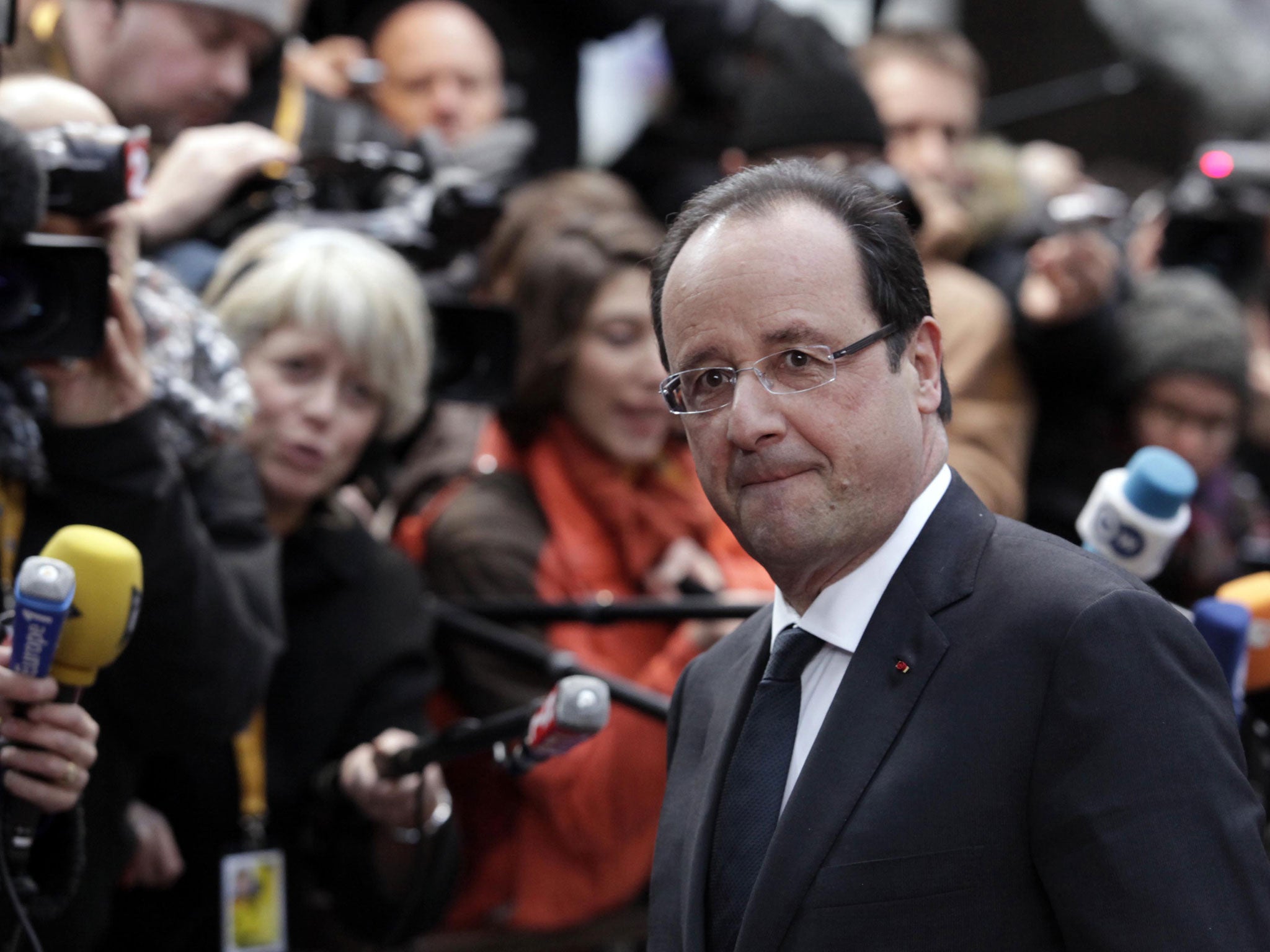François Hollande heading for crisis as he fails to deliver his promise to reduce unemployment
The French President staked his political credibility on a fall in the number of unemployed by the end of the year, but the figures are not going his way. What now for France’s increasingly unpopular leader, asks John Lichfield

President François Hollande suffered a blow tonight to what remains of his credibility with news that he had failed to deliver his promise to reduce unemployment by the end of this year.
Anxiously awaited jobless figures for November showed that the number of people without employment in France had increased by 17,500, almost wiping out a modest a reduction in French dole queues in October.
Tonight’s news made a chilling close to an annus horribilis for Mr Hollande, whose approval ratings have fallen faster and further in 2013 than for any head of state since France switched to a presidential system 50 years ago.
The President had staked his remaining political capital on a “reversal in the curve of unemployment” by the end of 2013. In other words the jobless rate would stop rising and begin to fall back.
Since his election 19 months ago, Mr Hollande has abandoned, forgotten or modified many promises but not this one. His mantra was consistent, despite the mockery of opponents and the doubts of economists. The promised fall in unemployment would be achieved.
The December statistics published next month will give Mr Hollande another chance to claim success. He insisted last night that the overall employment picture was improving and that his promised “turning of the tide” was under way. But yesterday’s figures will therefore be taken by critics and opposition politicians as proof that “Hollandism” – by its own definition – is failing.
The number of people out of work in France rose to 3,555,200 (including overseas territories) or roughly 10.5 per cent. This almost wiped out the 19,900 fall in the number of jobless in October – a figure that was seized upon by ministers as the first glimmering of an economic dawn.
The Employment Minister, Michel Sapin, said tonight that the overall picture remained “volatile” but encouraging.
If figures were taken over a number of months, and part-time working was taken into account, “we are in a period of amelioration”, he said. Mr Hollande said the promised “reversal of the curve has genuinely begun”.
In headline terms, this is unlikely to wash.
Critics will point to the fact that thousands of jobs have been “artificially” created by state investment in youth employment schemes and by a programme to cut payroll taxes for small and medium businesses.
They will also point to the gloomy employment and economic forecasts for 2014 made this month by Insee, the independent state agency which analyses the trends of the French economy.
Insee said that unemployment would continue on a broadly rising curved until the middle of next year.
France would end 2013, the agency said, barely out of recession with 0.2 per cent growth. This “fitful” recovery would continue through the first two quarters of 2014.
Tonight’s figures were a disappointment to a government which has spent most of 2013 fighting bad news – or fighting among themselves. Socialist Party leaders are already prepared for a double electoral humiliation in municipal election in March and the European elections in May.
President Hollande’s economic policy has been based on consensual, limited reforms, a series of much disputed tax hikes to reduce the state budget deficit but no large cuts in the sprawling French state.
The failure of the French economy to respond has been thrown into sharper relief by the success of the German economy and the somewhat stronger signs of recovery in Britain.
Mr Hollande told ministers at the beginning of his administration in May 2012 that they would face two or three rocky years but would reap the benefits of an economic turn-around in time for the Presidential and parliamentary elections of 2017. Even Mr Hollande did not expect such a deep freeze in the public mood.
Sources in the Elysée Palace say that the placid Mr Hollande has been shocked by the collapse of his approval ratings since September to the low 20s – lower than any other president of the Fifth Republic (post-1958).
Before the jobless figures, Mr Hollande’s popularity was beginning to pick itself up from the floor. One opinion poll last weekend showed a modest 2 per cent rise in his approval rating.
The government is bracing itself, all the same, for a difficult 2014. Quite apart from the elections and the stubbornly bad jobess figures , Mr Hollande and his equally unpopular Prime Minister, Jean-Marc Ayrault, will finally have to make tough decisions on state spending.
To hit the much-postponed eurozone target of a state budget deficit of only 3 per cent of GDP, France has to reduce the size of the state to 45.8 per cent of GDP by 2017.This will require €50bn in still unidentified cuts in three years in either the welfare state or the sprawling apparatus of government.
Although Mr Hollande has promised that there will be no significant new tax increases next year, several big hikes already programmed have yet to take effect, including a rise in VAT from next week.
Subscribe to Independent Premium to bookmark this article
Want to bookmark your favourite articles and stories to read or reference later? Start your Independent Premium subscription today.

Join our commenting forum
Join thought-provoking conversations, follow other Independent readers and see their replies